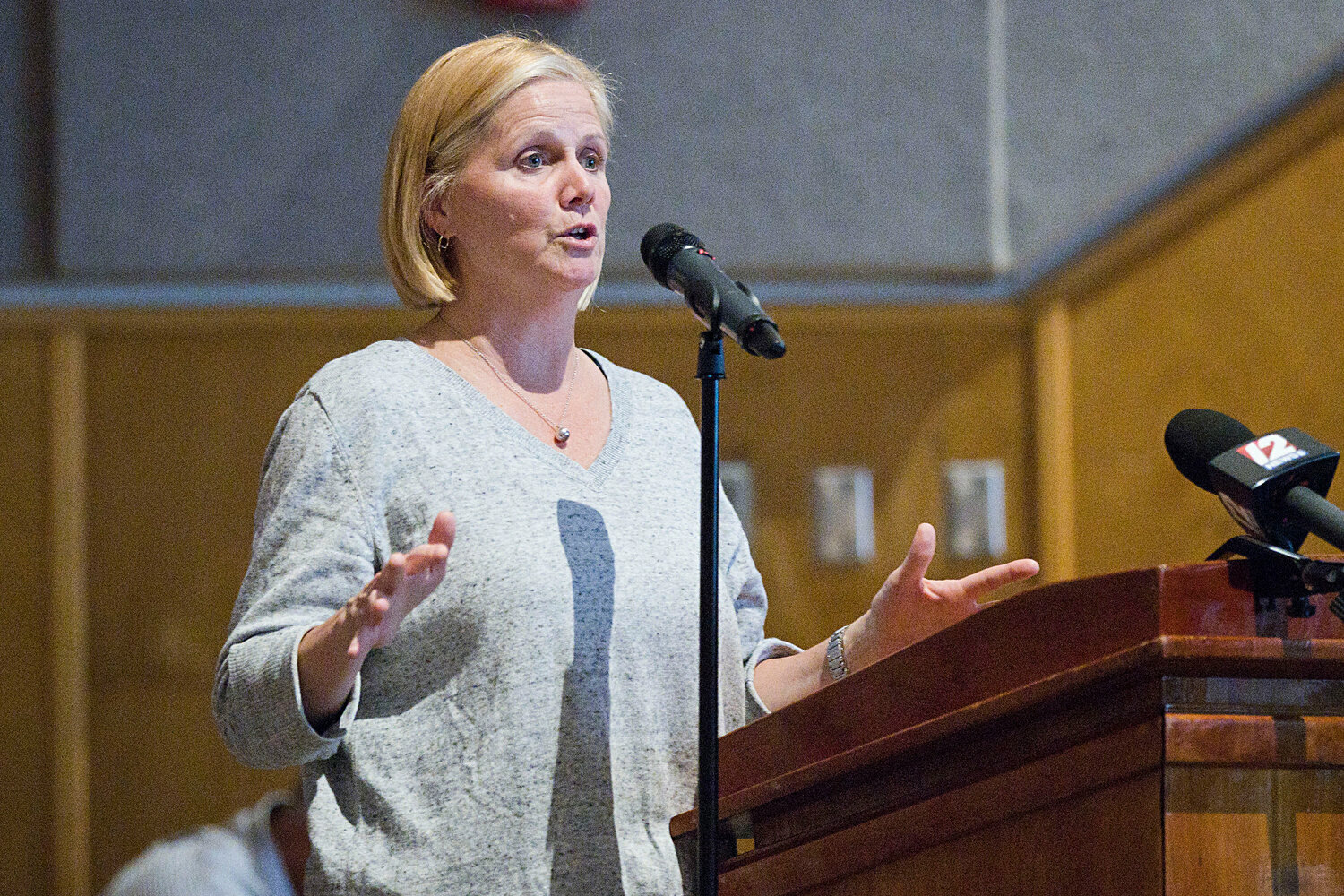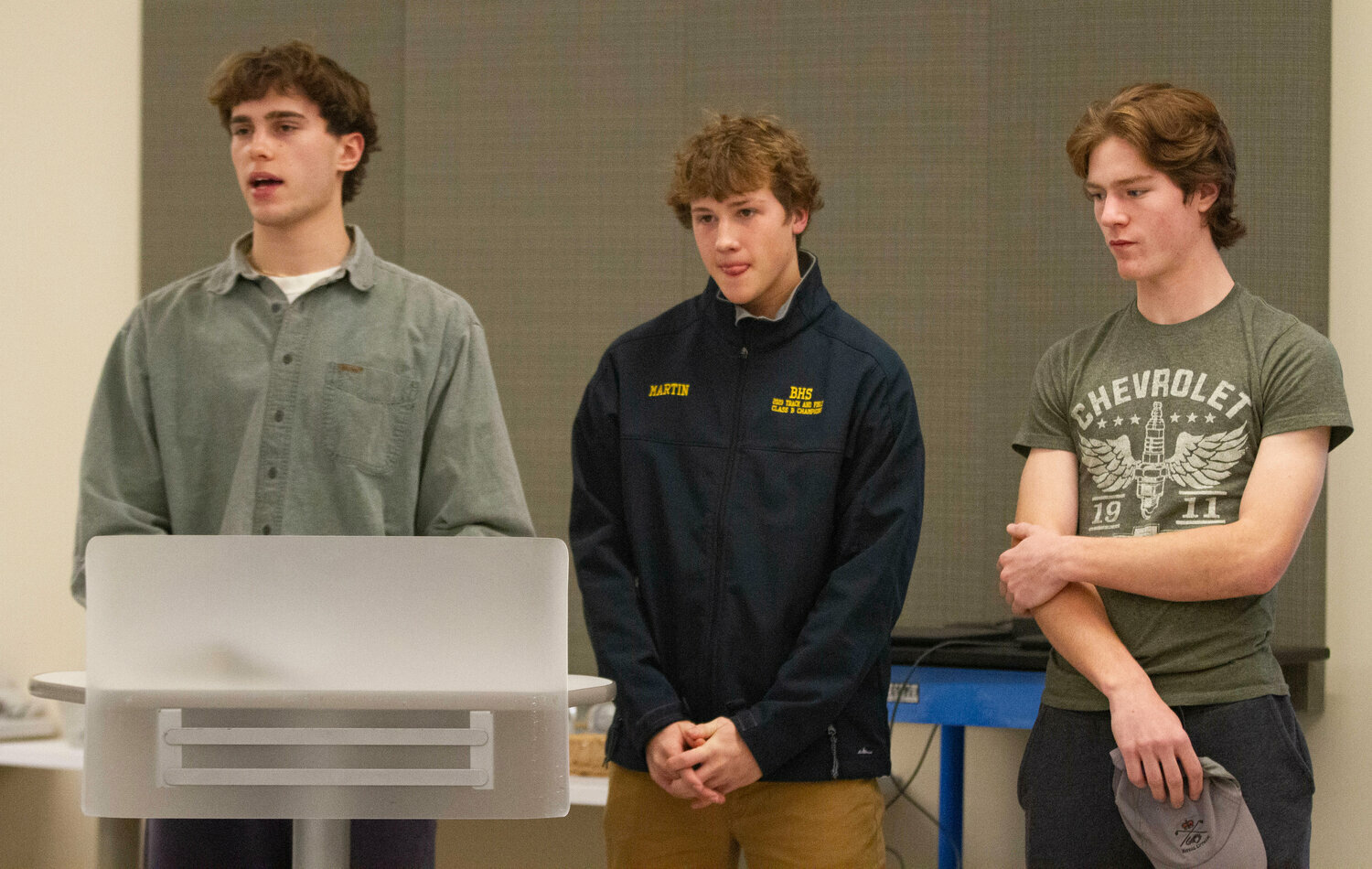- SATURDAY, APRIL 27, 2024
New report on government access – How does your town rate?
An ACLU report shows vast inconsistency in how top government bodies allow (or not) and restrict (or not) public involvement in their meetings
One law governs public meetings in Rhode Island, yet seemingly no two public meetings are the same. A sweeping analysis of “public comment” rules by the American Civil Liberties Union …
This item is available in full to subscribers.
Please log in to continue |
Register to post eventsIf you'd like to post an event to our calendar, you can create a free account by clicking here. Note that free accounts do not have access to our subscriber-only content. |
Day pass subscribers
Are you a day pass subscriber who needs to log in? Click here to continue.
New report on government access – How does your town rate?
An ACLU report shows vast inconsistency in how top government bodies allow (or not) and restrict (or not) public involvement in their meetings

The ACLU issued a series of recommendations for public bodies in Rhode Island:
• Every city and town council and school committee should set aside time for public comment at their meetings.
• While reasonable time limits can, and should, be set on how long any individual can speak, public bodies should not set overall time limits for public comment that prevent members of the public from being able to have a say at these meetings.
• Sign-up requirements immediately prior to a meeting may be established, but people who have not signed up should still be given the opportunity to speak at the end of the comment period.
• While comments can appropriately be limited to matters that fall within the jurisdiction of the public body, no restrictions on the content of comments should be imposed based on whether the topic is or is not on the agenda at any given meeting.
• Public bodies can request that speakers be respectful and courteous when talking, but the only specified enforceable limitation should be that speakers cannot be actually disruptive of the meeting.
One law governs public meetings in Rhode Island, yet seemingly no two public meetings are the same. A sweeping analysis of “public comment” rules by the American Civil Liberties Union (ACLU) Rhode Island found wide variation in how different communities, and sometimes different government bodies within the same community, allow the public to speak at public meetings.
Released last week, the ACLU report, based on a review of 39 city and town councils and 34 school districts, found that:
• Four public bodies appear to offer no public comment period at all during their meetings;
• About 20% of bodies set very brief time periods for public comment, some as little as 15 minutes during a meeting;
• Some boards require people to sign up to speak in advance, with one (the Johnston Town Council) requiring five-day advance notice in order to speak;
• Some public bodies require that people speak only about items that are on the agenda, while others require that they speak only about items that are not on the agenda for that meeting;
• Many have broadly worded “decorum” rules, banning discussion of “personnel,” or barring comments that are “uncivil,” “derogatory,” “impertinent,” or “inappropriate.”
According to the ACLU, all of these guidelines, time limits and policies can restrict free speech and infringe on an individual’s First Amendment rights.
The report states: “Many public bodies impose limitations on the content and substance of comments that members of the public can make. The restrictions often take two forms. Both are problematic, although one raises serious First Amendment concerns that the other does not.”
The first set of limitations is created when public bodies enforce rules about the topic in a public comment forum. States the report: “More than a few public bodies enforce a limit on the topics that can be discussed based on what appears on the meeting agenda. Paradoxically, some councils and school committees allow people to speak only on agenda items, while others allow people to speak only on non-agenda items. Either approach is poor public policy.
“To bar people from speaking on items that are directly on the agenda seems to turn the idea behind a public comment period on its head. One would expect public bodies to be especially interested in hearing from constituents on the items that are the actual topic of discussion at the meeting.
“On the other hand, barring members of the public from speaking on any matters that are not on the agenda means that a public body can avoid certain relevant topics that the public is concerned about by simply not including them on their meeting docket. Certainly, members of public bodies should be curious to hear from the public about new topics that constituents believe should be the subject of discussion.”
The second form of restriction is created by policies or guidelines governing the “decorum” or content of the public comments themselves. Per the report: “While the prohibition is often written in neutral terms, we have little doubt it is enforced selectively, to stifle only talk that is critical of municipal personnel. It is hard to believe that a school committee, for example, would stop a parent from standing up to commend the work of the school principal, even though that is a ‘personnel’ matter as much as is a demand that the principal be fired. Further, even if enforced neutrally, a content-based restriction on clearly relevant ‘personnel’ comments is constitutionally suspect.”
The ACLU cited one East Bay government body for having overly vague and problematic language in its public comment policy. “Many public bodies go further and contain the type of vague prohibitions on speech that a Massachusetts court found unconstitutional. A representative example is the Warren Town Council, which requires that speakers to ‘be courteous in their language and deportment.’ ”
The report went on the later criticize the Warren Town Council by stating: “The Warren Town Council bars any comments on ‘personalities,’ whatever that means, and particularly puts the kibosh on ‘derogatory remarks or insinuations in respect to any members of the council.’ ”
The report similarly criticizes the Tiverton School Committee for trying to prohibit “breech of respect.”
Read the full ACLU report here.
ACLU of Rhode Island Executive Director Steven Brown said: “The ability to share one’s opinion at a public meeting is a core feature of our democracy. This report should make it easy for officials and the public to evaluate current practices and consider ways to improve their policies and promote public participation.”
Following is a snapshot of what the ACLU found in each East Bay community …
Barrington
Town Council: The council sets no limits on the public comment period. It limits speakers to 3 minutes, and does not require advance registration to comment. The body states that public comments must be about items not on the agenda. There is no description of proper “decorum” for comments, thought the town’s DEI Committee has requested that the council adopt such language.
School Committee: The committee offers a public comment period with no time limits. Speakers are limited to 3 minutes each and must sign in with an email address. Persons are not supposed to speak about “personnel” matters.
Bristol
Town Council: The council offers a public comment with no stated restrictions on length of time or topic or type of speech. Speakers are asked to sign in with the Town Clerk before speaking.
Bristol Warren School Committee: The committee has a 15-minute public comment period, and speakers are limited to 3 minutes each. There are no limits on the subjects, and speakers are not required to register in advance.
East Providence
City Council: The council limits the public comment period to 30 minutes, and each speaker to 3 minutes. It asks that speakers sign in prior to the start of the meeting, and it requires that they state the subject of their comments. There are no restrictions on topic, whether the item is on the agenda or not.
School Committee: The committee limits speakers to 5 minutes and has no restrictions on the type of comments or the length of the public comment period. It also states no “decorum” policy and does not require speakers to register in advance.
Little Compton
Town Council: The council is one of four public bodies in the state without a stated “public comment” period. The others are the Providence City Council, North Providence Town Council, and New Shoreham School Committee. However, even though there is no public comment period, the public often participates and speaks throughout Little Compton Town Council meetings.
School Committee: The board sets no limit on the public comment period, but it does limit speakers to 3 minutes, requires advance registration, and limits comments to “items that are on the agenda of that meeting or that they would like to see on a future agenda.” The committee also bars comments on “personnel” issues or “confidential matters.”
Portsmouth
Town Council: The public is allowed to speak throughout council meetings about items on the agenda for that meeting, but there is no formal public comment period. The board does have a “decorum” clause, giving the president the authority to have someone removed from the meeting if they breech “such rules of decorum and order.”
School Committee: There is no limit on the time allotment for public comment, and no requirement to register in advance. However, speakers are limited to 2 minutes, and they must speak only to topics on the agenda for that meeting.
Tiverton
Town Council: The council has a public comment period with no stated limit. Speakers have up to 3 minutes. There is no advance registration required. However, speakers are required to talk about items on that meeting’s agenda. There are rules about decorum, and persons may be removed if they are “disorderly or disruptive.”
School Committee: The committee holds a public comment session with a 30-minute limit. Speakers are limited to 3 minutes each and must sign in prior to the meeting. They should be limited to topics not already on the agenda. Speakers must “refrain from obscenity, vulgarity or other breech of respect.”
Warren
Town Council: The council holds a public comment session with a 15-minute limit. Speakers are limited to 3 minutes, and they must sign in prior to the start of the meeting and specify the nature of their remarks. The council requires that all speakers “shall be courteous in their language and deportment and shall not engage in or discuss or comment on personalities, or indulge in derogatory remarks or insinuations in respect to any members of the council …”
Bristol Warren School Committee: The committee has a 15-minute public comment period, and speakers are limited to 3 minutes each. There are no limits on the subjects, and speakers are not required to register in advance.
Other items that may interest you









